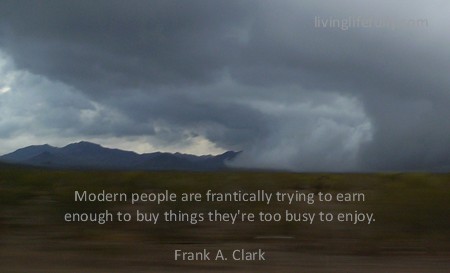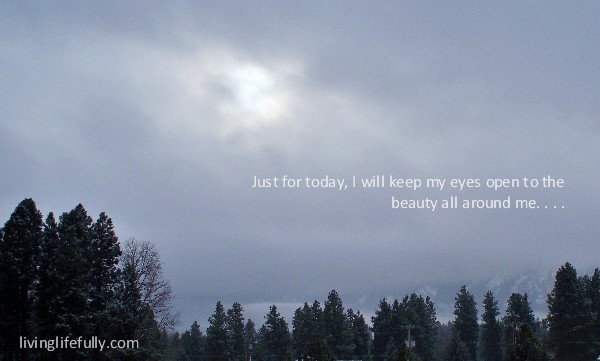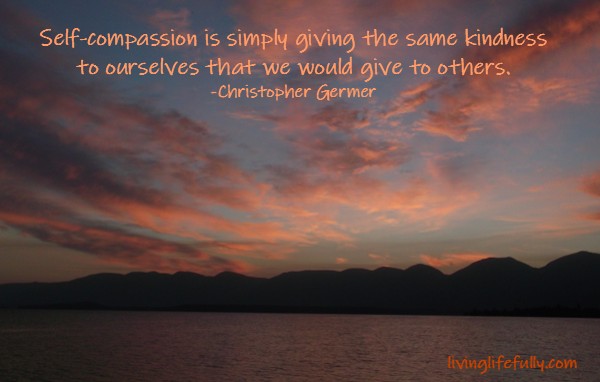|

1 July 2024
| |
|
|
| |
|
Simple and Profound
Thoughts
(from Simple
and Profound) |
|
In character,
in manners, in style, in all things
the supreme excellence is simplicity. -Henry
Wadsworth Longfellow
|
I believe the
art of living consists not so much in complicating
simple things as in
simplifying things that are not. -François Hertel
|
|
The highest service we can perform for
others
is to
help them help themselves. -Horace Mann
|
Wisdom is
not to be obtained from
textbooks,
but must be coined out of
human experience
in the flame of life. -Morris
Raphael Cohen
|
|
| |
|

|
| |
The
Power of Beliefs
Sue
Patton Thoele
Each of us functions within a set of beliefs. In
our lives, belief systems create order and
structure. They make important decisions easier,
and they provide the basis for our integrity, ethics,
and philosophy. Our personalities are structured
by the beliefs we learned from parents, teachers,
friends, and the culture around us.
For a great many of us, our parents' spoken and
unspoken beliefs have become our own. As adults
we no longer need to be told right from wrong because
our parents' voices are ingrained in us, telling us
how to behave and what's expected of us.
Our beliefs also arise from the ways we interpret what
we see and hear as we grow up. And it's
interesting to note that our beliefs frequently are
based far more on interpretation than on fact.
Virginia always broke corncobs in two before boiling
them. She never questioned the logic of that
behavior until her son asked her about it one
day. She did it because her mother did it.
When he probed further, her discovered that his
grandmother had a very logical explanation: her
pots were too small to accommodate the large ears of
corn grown in their fields. Virginia's belief
was a habit based not on an acknowledged truth but on
her own, unexamined interpretation of her mother's
actions as right and proper, whatever their origin.
Our
belief systems can also be created from fear.
|

|
If we
fear rejection or disapproval, we may believe that it
isn't safe to disagree with others. When our views
run contrary to popular opinion, we may find it hard to
speak our minds. Why? Because we fear the
consequences.
The culture around us also propagates inaccurate beliefs,
such as that men are more powerful than women or that men
should make more money because they have families to
support--a popular belief that statistics refute.
(At least 30 percent of all households in America today
are wholly supported by women, according to the Census
Bureau. And I bet those statistics are low.). . . .
Positive beliefs guide us; false beliefs handicap us. . .
.
An extremely important part of our work toward emotional
growth and change will come from examining our belief
systems regarding all areas of life. To gain the
courage to be yourself, you need to address the beliefs
that are keeping you stuck where you are. What
beliefs, assumptions, and attitudes are you holding onto
even though they no longer enhance your life? It is
possible to free yourself from worn-out beliefs and
acquire ones that bring happiness, strength, and
self-esteem.
What we believe we may become.
|
|
more
thoughts and ideas on beliefs
|
|
| |
|

(Simple and Profound is now a
part of this site. Visit by clicking
here.)
|
|
quotations
- contents
-
welcome
page
-
obstacles
the
people behind the words
-
our
current e-zine
-
articles
and excerpts
Daily
Meditations, Year One - Year
Two - Year Three
- Year Four
Sign up
for your free daily spiritual or general quotation ~ ~ Sign
up for your free daily meditation
|
| |
|

|
We
have some
inspiring and motivational books that may interest you. Our main way of supporting this site is
through the sale of books, either physical copies
or digital copies for your Amazon Kindle (including the
online reader). All of the money that we earn
through them comes back to the site
in one way or another. Just click on the picture
to the left to visit our page of books, both fiction and
non-fiction! |
|
| |
|

|
| |
How
to Make People Like You Instantly
Dale Carnegie
I was waiting in line to register a letter in the post office at
Thirty-third Street and Eighth Avenue in New York. I noticed
that the clerk appeared to be bored with the job--weighing
envelopes, handing out stamps, making change, issuing
receipts--the same monotonous grind year after year. So I
said to myself: "I am going to try to make that clerk
like me. Obviously, to make him like me, I must say
something nice, not about myself, but about him." And I
asked myself, "What is there about him that I can honestly
admire?" That is sometimes a hard question to answer,
especially with strangers; but, in this case, it happened to be
easy. I instantly saw something that I admired no end.
So while he was weighing my envelope, I remarked with
enthusiasm: "I certainly wish I had your head of
hair."
He looked up, half-startled, his face beaming with a smile.
"Well, it isn't as good as it used to be," he said
modestly. I assured him that although it might have lost
some of its pristine glory, nevertheless it was still
magnificent. He was immensely pleased. We carried on a
pleasant little conversation and the last thing he said to me
was: "Many people have admired my hair."
I'll bet that person went out to lunch that day walking on
air. I'll bet he went home that night and told his wife
about it. I'll bet he looked in the mirror and said:
"It is a beautiful head of hair."
I told this story once in public and a man asked me
afterwards: "What did you want to get out of him?"
What was I trying to get out of him!!! What was I trying to
get out of him!!!
If we are so contemptibly selfish that we can't radiate a little
happiness and pass on a bit of honest appreciation without trying
to get something out of the other person in return--if our souls
are no bigger than sour crab apples, we shall meet with the
failure we so richly deserve.
Oh, yes, I did want something out of that chap. I wanted
something priceless. And I got it. I got the feeling
that I had done something for him without his being able to do
anything whatever in return for me. That is a feeling that
flows and sings in your memory long after the incident is past.
There is one all-important law of human conduct. If we obey
that law, we shall almost never get into trouble. In fact,
that law, if obeyed, will bring us countless friends and constant
happiness. But the very instant we break the law, we shall
get into endless trouble. The law is this: Always
make the other person feel important. John Dewey said
that the desire to be important is the deepest urge in human
nature; and William James said: "The deepest principle
in human nature is the craving to be appreciated." As I
have already pointed out, it is this urge that differentiates us
from the animals. It is this urge that has been responsible
for civilization itself.
You want the approval of those with whom you come in
contact. You want recognition of your true worth. You
want a feeling that you are important in your little world.
You don't want to listen to cheap, insincere flattery, but you do
crave sincere appreciation. You want your friends and
associates to be, as Charles Schwab put it, "hearty in their
approbation and lavish in their praise." All of us want
that.
So let's obey the Golden Rule, and give unto others what we would
have others give unto us.
How? When? Where? The answer is: All the
time, everywhere.
|
|
| |
|

|
|
Living
Life Fully, the e-zine
exists to try to provide for visitors of the world wide web a
place
of growth, peace, inspiration, and encouragement. Our
articles
are presented as thoughts of the authors--by no means do
we
mean to present them as ways that anyone has to live
life. Take
from them what you will, and disagree with
whatever you disagree
with--just know that they'll be here for you
each week. |
|
| |
|
People who take the risk make a tremendous
discovery: The more things
you care about, and the
more intensely you care, the more alive you are.
This
capacity for caring can illuminate any relationship:
marriage, family,
friendships--even the ties of affection
that often join humans and animals.
Each of us is born
with some of it, but whether we let it expand or diminish
is
largely up to us. To care, you have to surrender the
armor of indifference.
You have to be willing to act,
to make the first move.
Arthur Gordon
|
| |

|
Happiness
I know some people who,
I'm sorry to say, probably will never be happy.
They're living on the same planet as the rest of us,
have the same opportunities as those people around them,
know people who are very similar to the people everyone
else knows, and whose bodies function just as well as
other people's bodies, yet they look at the world in
dark and depressing ways. They don't see
opportunity, but rather limitations. They don't
see other people as potential friends or at least fellow
travelers to the grave; rather, they see them as threats
or at the very most as wastes of their time.
Sometimes I feel that the main goal in life is to be
happy, and from happiness, all other good things will
spring. The truly happy person is more likely to
serve others, to feel hope and compassion, to love
others unconditionally, because they don't have a lot of
emotional needs that they expect others to
fulfill. They're happy because they see the world
as a bright and beautiful place, and they're right there
in the middle of it. And they're happy because
they've made the most of their opportunities, and
they're grateful for having had them. And they're
happy because they've spread love to others, even in
very small ways that may seem insignificant to other
people who probably aren't all that happy because they
need to judge all the things that other people do.
|
|
|
|
The
happiness which we receive from ourselves is greater
than that which
we
obtain from our surroundings. . . .The
world in which a person lives shapes itself chiefly by the
way in which he or she looks at it.
Arthur Schopenhauer
|
|
|
As I grow older and
older, I realize that most of my happiness depends
upon me and not just on the ways that I see the
world, but also on the ways that I act in the
world. I can see the world as a wonderful
place, but if I don't contribute to that wonder, I'm
pretty sure that I won't be happy. Therefore,
I'm busier in some ways than many other people who
have hours a day to spend in front of the television
or computer screen, but I'm busy doing things that I
love doing, so that's okay. (I still need
rests from these things, though, but that's for next
week!) I don't feel obligated to contribute
and I don't feel that others judge me harshly if I
don't contribute, but the ways I feel when I do
contribute make it all completely worthwhile.
I've also learned to keep my expectations fairly
low, not because I don't think that others are
capable of meeting high expectations, but because my
judgment doesn't help other people to grow and
thrive and be happy themselves. I don't know
where other people are in their journeys, and
there's no justification for me to expect them to be
at certain points that they may or may not have
reached yet. They are where they are, and it's
my responsibility--especially with my students--to
find out where that is and meet them there rather
than expecting them to meet me where I am.
|
|
|
|
It was probably a mistake to pursue happiness;
much better to
create happiness;
still better to create happiness
for others. The
more happiness you created for others
the more would be yours—a
solid satisfaction that no one could ever take away from you.
Lloyd Douglas
|
|
|
I want to be happy,
but I don't want to be so at the expense of
others--I don't want to find my happiness in the act
of defeating others or making them less than they
are. I want to be happy, but I can't just
simply sit around and wait for the world to make
me happy--I need to take an active role in finding
and maintaining the happy states in my life. I
know that I would not be happy doing something like
going to the beach every day for the rest of my life
and sitting in the sun. That's a very
enjoyable pastime now and then, but it doesn't make
for a life. I'll never be happy watching
television for hours every day--then I'm passively
taking in other people's work, other people's
perspectives, other people's creativity.
I'm fortunate to have identified some of my
strengths, and the things that I'm strongest at are
the things that I'm using right now to contribute to
others. I'm a good runner, so I'm volunteering
my time to help coach a kids' track and
cross-country team. I'm good at languages, so
I'm teaching languages right now as my main source
of income. I'm good at reading and
interpreting literature, so I've spent many years
teaching others to do the same thing in my English
classes. I'm good at writing, so I'm trying to
write as much as I can in ways that may or may not
help others--I can't control whether those ways
actually do help others, but I can put my stuff out
there for others to access, and let life take care
of the rest.
|
|
|
|
The life that is sharing in the interests, the
welfare, and the happiness
of others is the one that is
continually expanding in beauty
and in power and, therefore, in
happiness.
Ralph Waldo Trine
|
|
|
Perhaps the key to all
my efforts are the last seven words there:
"let life take care of the rest."
I've identified my strengths and I'm using them, but
happiness would still be hard to find if I had high
expectations about how people react to what I
do. As a teacher, I don't get disappointed in
students who don't understand what I'm teaching, for
that disappointment would drag me down.
Rather, I look for other ways to present the
material so that they may get it easier. As a
coach, I don't expect every runner to improve their
times by certain amounts--instead, I'm glad when
they put forth the effort because I know that not
everyone's mind and body are ready for the type of
running that we're doing. My happiness does
not depend on their performance, though I do make
every effort that I can to help them to improve.
There are things that I'm bad at, too, and I do not
let those things erode or deteriorate my
happiness. I accept my lack of ability and do
the best I can in those areas, and I even try to
improve in them, but I don't beat myself up about
them if I don't perform to certain standards.
While I'm quite good at painting the walls of a
room, I'm not very good at all at painting
pictures. That's okay. I'm quite good at
encouraging other people, but I'm not good at all at
meeting strangers, except in certain well-defined
situations. That's okay--I'll never be a
social butterfly, but I can live with that. If
my social calendar were fuller, I wouldn't have time
to do many of the other things that I do.
I want to be happy, and it's important that I do the
things that will make me happy and that I do my best
to add something positive to the lives of
others. That will give me the sense of
accomplishment and satisfaction that will help me to
be happy, as long as I don't mess it up by adding to
the mix expectations that probably can't be
met--which would lead to my disappointment, which
would diminish my happiness, etc., etc. My
happiness is within my reach because I determine
whether I'm creating the conditions in which it can
thrive or not, and I determine just what I need to
do to make happiness a real part of my life.
|
|
More
on happiness.
|
|
|
|
|
|
|
| |
|

|
| |
|
 ™ ™
|
|
All contents
© 2024 Living Life Fully™,
all rights reserved.
Please feel
free to re-use material from this site other than
copyrighted articles--
contact each author for permission to use those.
If you use material, it would be
greatly appreciated if you would provide credit and
a link back to the original
source, and let us know where the material is
published. Thank you. |
|
| |
|

|
|
Lack of activity destroys
the good condition
of
every human being,
while movement and
methodical physical exercise
save it and
preserve it.
Plato
|
|
| |
Working with
children on the writing of poetry has led me to ponder the ways
that most of us become exiled from the certainties of childhood;
how it is that the things we most treasure when we're young are
exactly those things we come to spurn as teenagers and young
adults. Very small children are often conscious of God,
for example, in ways that adults seldom are. They sing to
God, they talk to God, they recognize divine presence in the
world around them. . . . Yet these budding theologians often
despise church by the time they're in eighth grade.
In a similar way, the children who un-selfconsciously make up
songs and poems when they're young--I once observed a
three-year-old singing a passionate ode to the colorful
vegetables in a supermarket--quickly come to regard poetry as
meaningless and irrelevant. . . . I wonder if children don't
begin to reject both poetry and religion for similar reasons,
because the way both are taught takes the life out of
them. If we teach children when they're young to reject
their epiphanies, then it's no wonder that we end up with so
many adults who are poetically and theologically illiterate.
Kathleen Norris
The Cloister Walk
|
|
| |
|
|

|
| |
|
When we can
begin to take our failures non-seriously,
it means we are ceasing to be
afraid of them.
It is of immense importance to learn to laugh at
ourselves.
Katherine Mansfield
|
| |
|
